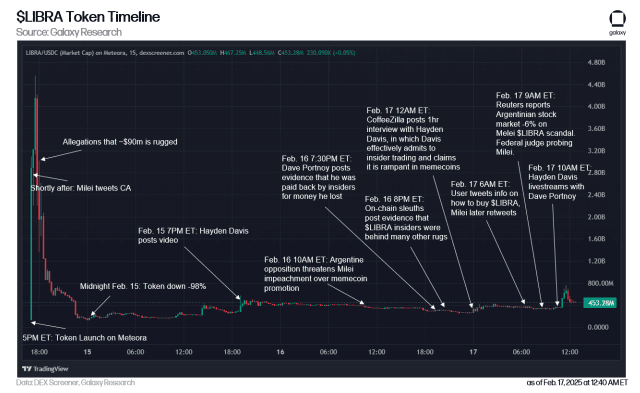The LIBRA Token Fiasco: A Cautionary Tale for the Memecoin Market

The recent excitement sparked by U.S. President Donald Trump’s TRUMP memecoin launch has culminated in a whirlwind of trading activity, with traders making and losing millions in mere moments. However, the high-flying world of memecoins faced a serious setback with the dramatic fallout from the LIBRA token incident. This Solana-based project, which garnered attention after Argentine President Javier Milei tweeted about it on February 14, saw its market cap soar to an astonishing $4.5 billion, only to plummet by over 80% within hours as insiders rushed to cash out, leaving many unsuspecting investors with heavy losses.
The situation escalated into an international political controversy over the weekend. In the days following the initial hype, Milei deleted his original tweet endorsing LIBRA, refuted any association with the project, and accused his political opponents of orchestrating mischief. This series of events sparked discussions of potential impeachment and created palpable uncertainty in the Argentinian stock market. Just when it seemed that things couldn’t get any more complicated, an explosive revelation emerged.
On Tuesday, CoinDesk reported that a key player behind the LIBRA token had boasted about securing access to President Milei’s inner circle months prior to the scandalous launch and subsequent collapse of the memecoin. While such controversies are not uncommon in the volatile memecoin space, the nature of this incident, alongside the following fallout, underscored the significant risks associated with unregulated crypto trading, as well as the potential reputational damage to the entire memecoin sector.
Assessing the Impact
According to FRNT Financial, a Toronto-based cryptocurrency platform, “The LIBRA episode represents a potential tipping point for the memecoin landscape. The novelty surrounding new projects has begun to fade, especially after the launches of TRUMP, MELANIA, and now LIBRA.” They further cautioned that the reputational repercussions for these types of assets could be profound. “It seems that this incident is likely to unravel further as new information comes to light. Currently, memecoins are becoming synonymous with ‘pump and dump’ schemes,” they noted.
In light of these events, there is a growing sentiment within the community that self-regulation is necessary to safeguard the interests of users. Chris Chung, founder of the Solana-based swap platform Titan, remarked, “The entire LIBRA memecoin debacle should remind all of us in the decentralized finance community that we have a collective responsibility to enhance the safety of this space for its participants.”
How the Fiasco Unfolded
The LIBRA saga played out dramatically over just a few days, starting on February 14. As explained by Alex Thorn of Galaxy Research, the token launched that day on the Solana-based decentralized exchange (DeX) known as Meteora. President Milei’s initial post on social media platform X (now deleted) claimed that the purpose of the token was to foster growth in the Argentinian economy—a significant endorsement for a memecoin.
Once the token reached its peak valuation of $4.4 billion in just hours, insiders began to liquidate their holdings, generating nearly $100 million in profit, according to on-chain analytics. The following day, Milei’s deletion of his original post sent shockwaves through the memecoin community, leading to a rapid sell-off of similar tokens, including TRUMP and MELANIA. Meanwhile, Solana’s native token, SOL, also experienced a decline.
In his subsequent post, Milei claimed ignorance regarding the project’s specifics and pointed fingers at the political opposition for the turmoil, effectively turning the situation into a political battleground. By this time, the token had wiped out approximately $4.5 billion in retail investments in a mere seven hours, leaving its current market cap hovering just above half a million, according to data from CoinMarketCap.
As the week progressed, several influential figures in the crypto community emerged, including Barstool’s Dave Portnoy, Threadguy, Hayden Davis, and Faze Banks, each of whom had varying levels of involvement with LIBRA. Portnoy disclosed that he had been an early investor and was able to recoup his investment, fueling the controversy that insiders had reaped the rewards while ordinary investors faced significant losses. Meanwhile, Davis stated that he was behind both the LIBRA and MELANIA memecoins, characterizing the incident as “not a rug pull,” but rather “a plan that went horribly wrong.”
The situation escalated further when the Argentinian opposition threatened to impeach Milei over the fiasco. On February 17, Ben Chow, co-founder of the Meteora DeX where LIBRA launched, stepped down in light of the controversy. Chow had also co-founded the Solana-based trading aggregator Jupiter. On the same day, Argentina’s stock market plummeted nearly 6% amid reports of an investigation into Milei.
On February 18, CoinDesk revealed that Davis had claimed in text messages that he could “control” Milei due to payments he had made to Karina Milei, a prominent figure in the president’s government and his sister.
A Setback for the Crypto Sector
The future remains uncertain for Milei and all parties implicated in this unfolding drama. However, reflecting on the notorious collapse of FTX, it is clear that there are still many complexities to unravel in this narrative. This incident highlights that the memecoin drama, characterized by rapid profits and losses, may be at a critical juncture. While institutional investors are increasingly investing in Bitcoin and Ethereum through newly launched exchange-traded funds, making these assets more appealing and stable, the memecoin sector risks becoming the outlier of the cryptocurrency ecosystem. This incident could potentially deter retail investors from participating in this space.
Chung summarized the implications succinctly, stating, “Overall, this entire saga represents a significant setback for the crypto landscape. If we aim to attract new retail users, this is certainly not the way to go about it.”






